Friends of Watoto Kwanza Kenya from Ireland
Date of Visit: June 26th 2024 (Second Term)
Attendees:
- Visitors from Ireland: Mr. & Mrs. Gatere and Ann Mburu
- Team from Watoto kwanza: Josephine Ng’ang’a, Nelly Waithera, Peter Ngugi
Purpose of Visit:
The visit aimed to deliver donations to several schools, engage with students and staff, and discuss the overall welfare and progress of the students in these institutions.
Donations and Distribution:
Ng’ate Primary School:
- Clothes: A variety of clothing items were donated to support the children, particularly those from disadvantaged backgrounds
- School game kits: Various sports equipment to encourage physical activities and teamwork among student
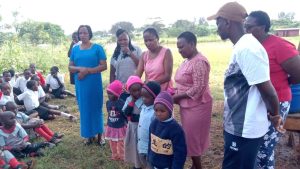
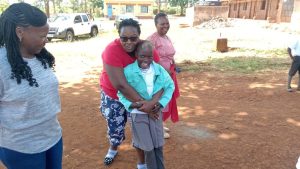
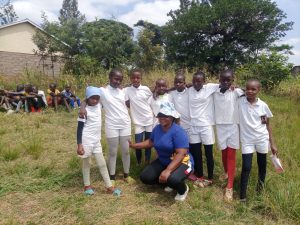
Mukeu Primary School:
- Dining Chairs: New dining chairs were provided to enhance the students’ dining experience and create a more comfortable environment during meals.
- Dry Food Stuffs: Essential food items, including maize flour, beans, and cooking oil, were donated to boost the school’s feeding program, ensuring that students receive nutritious meals.
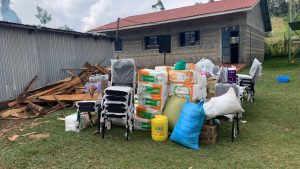
Patrick’s Main Primary School:
- Sanitary Pads: Sanitary pads were distributed to female students, addressing the critical need for menstrual hygiene management and supporting their school attendance and participation.
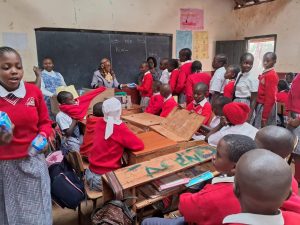
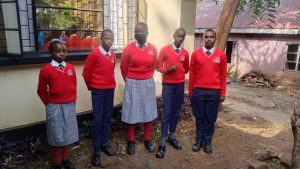
Activities:
Student Sessions:
- Encouragement and Motivation: The visitors from Ireland conducted sessions with students at all three schools, sharing motivational stories and encouraging them to focus on their education and personal growth.
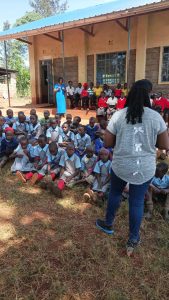

- Student Participation: The students actively participated by asking questions, expressing their thoughts, and thanking the visitors for their generosity. These interactions fostered a positive atmosphere and strengthened the bond between the students and the visitors.
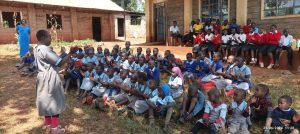
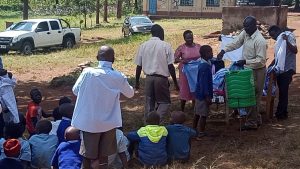
- Educational Guidance: The students received advice on academic excellence, discipline, and the importance of education in building a better future.
Teacher and Principal Sessions:
- Welfare Discussion: The teachers and principals from each school discussed the welfare of the students, highlighting specific challenges such as food insecurity, absenteeism, and resource limitations.
- Program Progress: Updates were shared regarding the progress of the Watoto Kwanza programs in each school, including successes and areas that require further support.
- Challenges and Mitigation Strategies: The sessions also explored strategies to address the challenges identified, with a focus on enhanced community involvement and resource mobilization.
Observations:
- Student Engagement: Students were highly engaged during the sessions, showing interest in the motivational talks and the educational pointers provided. Their active participation and expressions of gratitude left a lasting impression on the visitors.
- Teacher Feedback: Teachers expressed gratitude for the donations, noting that the items would significantly impact the students’ morale and well-being.
- Resource Improvement: The donation of dining chairs and dry food items at Mukeu Primary School, clothes and game kits donation at Ng’ate primary school, pads donation at St Patrick’s primary school was particularly appreciated, as it directly improved the students’ daily school experience.
- Commitment to Welfare: The school staff demonstrated a strong commitment to improving the students’ welfare and academic performance, despite the ongoing challenges they face.
Conclusion:
The visit by Friends of Watoto Kwanza Kenya from Ireland was highly impactful, with significant contributions made to Ng’ate Primary School, Mukeu Primary School, and St. Patrick’s Main Primary School. The distribution of clothes, game kits, dining chairs, dry food items, and sanitary pads will greatly benefit the students and staff. The sessions, which included active participation from the students, provided valuable insights and encouragement, reinforcing the importance of continued support and collaboration to address the ongoing challenges and ensure the success of the programs.
Recommendations:
- Follow-Up Visits: Regular visits by supporters and donors to monitor progress and provide ongoing motivation to the students.
- Resource Mobilization: Seek additional resources and partnerships to address the identified challenges, particularly in food security and educational materials.
- Community Engagement: Enhance community involvement to create a supportive environment for the students and the schools.

 +254 000 000 000
+254 000 000 000 info@watotokwanzakenya.org
info@watotokwanzakenya.org